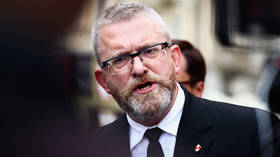ROAR: “Russia is neither with the West nor with Iran”

As the EU and Canada have imposed a new round of sanctions against Iran, Russia has rejected Tehran’s “fruitless and irresponsible rhetoric.”
Iranian President Mahmud Ahmadinejad’s recent statements distorted Moscow’s objective approach to Tehran’s nuclear program, the Russian Foreign Ministry said on July 26. Ahmadinejad last week accused Russia of joining the US in spreading lies about Iran’s activities in the nuclear sphere. He also described President Dmitry Medvedev as “spokesman” for the “enemies of Iran.”
Ahmadinejad said Russia panders to the Western countries in attempts to isolate the Islamic republic by saying that Iran is getting closer to being able to develop nuclear weapons. Meanwhile, the Western states are planning to attack two Arab countries in the region, he added.
Moscow’s “independent and constructive line” aims to find a political and diplomatic settlement of the problem, the Russian Foreign Ministry said, calling Ahmadinejad’s statements “unacceptable.”
“Instead of engaging in fruitless and irresponsible rhetoric, the Iranian leadership should have taken concrete and constructive steps to settle the situation as soon as possible,” the ministry said. It added that Russia supported dialogue between Iran, Brazil and Turkey and counts on an early resumption of talks between Tehran and six world powers, the statement read.
Many foreign ministers of European Union countries believe that new EU sanctions will finally “persuade Tehran to take the talks with the six international intermediaries seriously,” Rossiyskaya Gazeta said. However, some of them are more skeptical, the paper noted. “And it is not ruled out that the consequences of Iranian’s response may be more painful for Europe’s economy.”
“The EU has never imposed such tough restrictions against Iran or any other country,” the daily said, adding that the country’s oil and gas sectors may suffer most.
The new round of “the conflict between Iran and the rest of the world” started on June 10 when the UN Security Council adopted its resolution, the paper said. Then Washington approved its unilateral sanctions.
“The EU also promised to follow the USA’s example, but its bureaucratic machine proved to be more complicated,” the daily said. Now the whole package of EU sanctions starts on July 27.
The Iranian leadership’s “inaction and an open unwillingness for a constructive dialogue” has left supporters of the talks that rule out sanctions without arguments, the paper said. But Tehran is still continuing to criticize other countries, it added.
Moreover, Iran may close its accounts in banks of the states that joined the sanctions, the paper said. It concerns first of all European banks. “There will be no catastrophe, but a tangible strike will be dealt to the stability of European bank system,” the paper noted.
Iran has promised to consider any country that “joins the US scenario” as its enemy, the daily said. “That means that not only the US and the EU member states, but also Russia and China, which supported sanctions in the Security Council, have become enemies for Ahmadinejad,” it said.
But the sanctions will not make Iran stronger, as its leader says, the daily noted. “Otherwise, why did Tehran summon a meeting in Istanbul of the foreign ministers of Iran, Turkey and Brazil two days before their EU counterparts met?” the paper asked. And the next day, Iranian’s foreign minister Manouchehr Mottaki said his country was ready to discuss the nuclear fuel swap deal.
However, the US, EU, Russia and China are waiting for “clear answers from Iran rather than readiness to start everything from the beginning,” the paper concluded.
Russia’s position has not been “clear” in this issue for a long time, but new sanctions may be advantageous for it, believes Konstantin Simonov, director general of the National Energy Security Fund.
Moscow does not have any large-scale plans in Iran, Simionov told Finam FM radio. “I think our position towards that country lacks foresight. We support sanctions, but we are doing it somehow cunningly, and Western countries are not satisfied with our soft approach,” he said.
At the same time, Iran is discontented with “Russia’s pressure,” the analyst said. “It seems that we are not with the West. But we are not with Iran either because it presents a threat to us as a country that can compete with Russia on the European gas market.”
Russia’s task is to think how it could “block Iran as a competitor,” Simonov noted. “I think tougher sanctions are more advantageous for Russia.”
Meanwhile, former CIA director Michael Hayden has said that bombing Iran’s nuclear facilities “might not be the worst” option for the US. He described the possible attack as “inexorable” because the Iranians “continue to move forward.”
“If the Iranian leadership actually wants to come to an agreement, then it is Barack Obama’s administration that presents a window of opportunity to it,” believes Dmitry Trenin, director of the Carnegie Moscow Center. However, “a hand extended to Iran a year and a half ago is continuing to hang in the air, and an unpleasant scenario of a forceful action becomes quite real,” he told Kommersant daily.
Tehran on July 26 said it was ready to return to negotiations on a nuclear fuel swap. But its proposal to realize the initiative agreed on May 17 by Iran, Turkey and Brazil is unlikely to change the situation, the paper said. The world powers do not consider it “a fundamental means of solving the Iranian nuclear problem,” the paper said.
Sergey Borisov,
Russian Opinion and Analysis Review, RT













